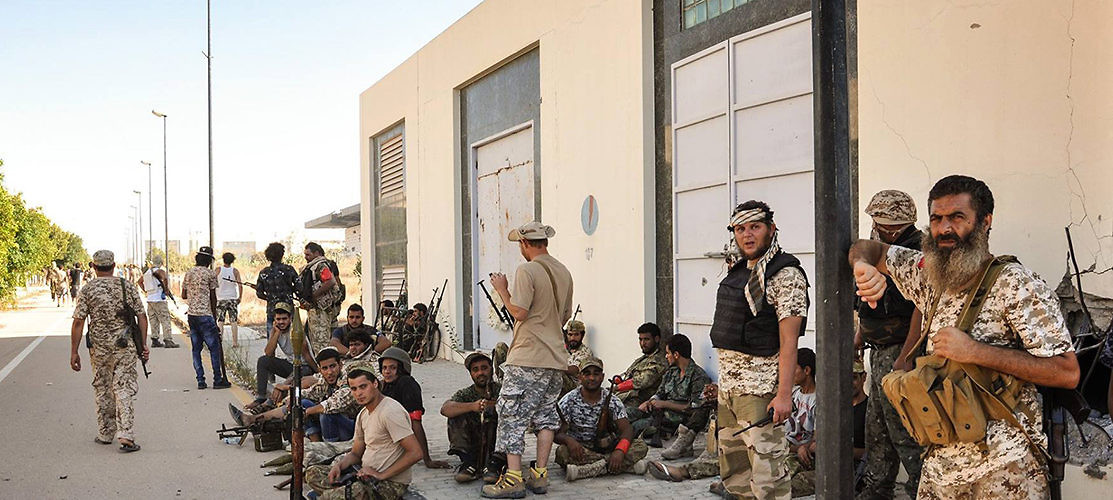US-backed forces gather after retaking key areas from the Islamic State. Sirte, Libya, August 11, 2016. (Associated Press)
The United States has conducted multiple airstrikes on Islamic State targets in Sirte, northern Libya, since the start of August. The strikes are the first confirmed by the US in the North African country since February this year, when ISIS targets were hit near Sabratha. The increasing involvement of a major foreign power in the conflict is likely to produce short-term victories but faces a longer-term dilemma: Libyans increasingly view foreign interference negatively, as they attempt to unify disparate political entities. Supporting this unification process should remain the priority for foreign governments.
The US airstrikes have been approved by the United Nations-backed Government of National Accord (GNA) and were described by the Pentagon as a continuation of its policy of combating ISIS “by working with capable and motivated local forces.” Russia, which has an interest in the outcome of Libya’s political process, initially condemned the US action as illegal, but has since adopted a more accommodating view.
The GNA’s approval of the US strikes followed a period in which its military forces had been struggling to land a decisive blow against ISIS in Sirte. The operation to liberate the former Muammar Gaddafi stronghold began in May with much fanfare and optimism. However, following an initial drive towards the city, the forces involved have encountered increasingly stiff resistance, as about 300 related fatalities and more than 1,500 injuries attest.
The US strikes also followed days after French President Francois Hollande acknowledged, for the first time, that his country’s Special Forces were involved in the Libyan conflict. The confirmation was prompted by the death of three French soldiers in Benghazi. In contrast to that of the US, the French activity prompted GNA Chief Fayez al-Serraj to deliver a formal protest to the government in Paris. Foreign intervention in Libya remains a highly divisive issue and Serraj sought to offset criticism that his government was unduly influenced by, and reliant on, the West. These public statements aside, the involvement of the French and a number of other foreign forces remains an open secret.
Predictably, opponents of the GNA also organized protests against the French announcement. Demonstrations in several cities in western Libya were hastily arranged on July 22 in an attempt to delegitimize the GNA. The protests have come to nothing but do highlight the divisions within Libya, which, arguably, pose an even greater risk to the stability of the country than that of ISIS, at least over the long-term.
The ISIS presence in Libya has proven to be a double-edged sword for the country’s future stability. While the group poses a risk to all rival governments and Western political and business interests, its activity has served to unite Libya’s disparate groups around a common goal, much like the 2011 conflict against the Gaddafi regime. Yet the destruction of ISIS also remains atop the West’s Libya-focused agenda and may draw these countries further into Libya, causing further political disruptions. Sirte is one of the primary ISIS strongholds in the region and its proximity to militant-weary Europe is a key concern of the continent’s leaders, which have supported the foreign forces battling the extremists in Libya.
The presence of US, French, and other Western militaries, coupled with ISIS’s technological, resource, and manpower inferiority, means it is but a matter of time before the extremist group loses Sirte. It has suffered many defeats since late November, mirroring similar trends in Syria and Iraq. However, like these countries, the stability of Libya will be determined not by the defeat of the group but on the eventual unification of the forces arrayed against it.
The rival House of Representatives (HoR) government, which leads the Libyan National Army and dominates the eastern half of the country, has yet to officially recognize the GNA. The GNA has also failed to secure many western areas. Just a few miles outside the capital, for example, the Warshefana tribal area remains in the grip of criminal bands. Spikes in kidnapping and crime in this area and elsewhere, such as in the far south in Sabha, have underlined the struggle the GNA faces even if it is eventually acknowledged as the country’s sole government.
Once the GNA and its allies defeat ISIS it will also need to secure the support of the powerful administration of the city of Misrata. While Misrata continues to provide men and material to the Sirte front, there is no guarantee its leaders will continue to abide by GNA decisions once ISIS is defeated. Dozens of local-level militias, each with a stake in the outcome of the political process, are also arrayed in towns and cities across the west, south, and east. In addition, the GNA’s military and police forces remain weak and divided and it will be a number of years before it is able to meet the country’s various political and security challenges. These challenges don’t even touch on basic service delivery, a key requirement to secure the support of the public. Furthermore, services are dependent on an income stream. The oil sector, which accounts for the bulk of the state’s funds, remains largely offline. With conflict and political disputes abounding, it is unlikely to reach its production potential this year.
The impact of Libya’s 2011 revolution and overthrow of Gaddafi continues to resonate and will likely determine the country’s direction for many years to come. The former leader ruled with an iron fist and kept the state’s multiple rival political and armed actors in check. In the current environment, Western military action is seen as critical in defeating illegitimate forces such as ISIS, but the policy of the US, France, and other counties must, as a matter of urgency, prioritize the unification of the Libya’s primary political actors, including the GNA, HoR, disaffected members of the largely defunct General National Congress, the leadership in Misrata, the country’s various ethnic and tribal groups, and Islamists, to achieve stabilization.





